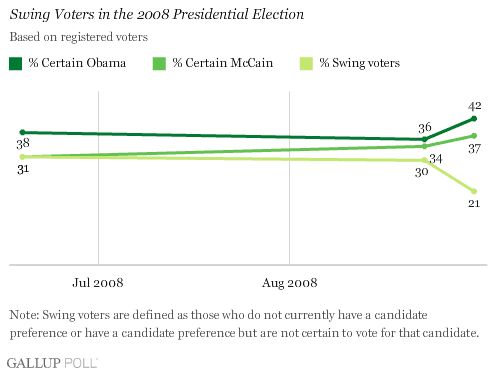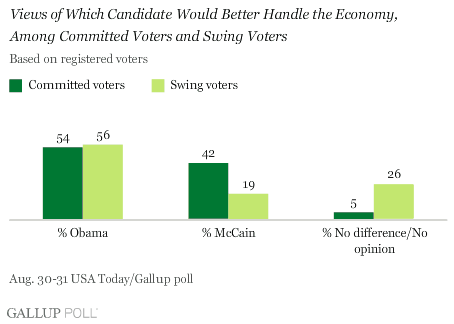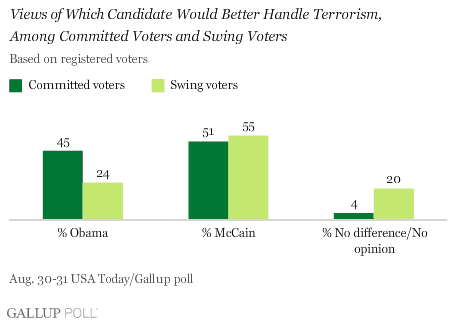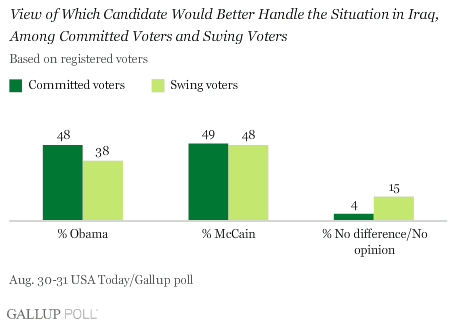PRINCETON, NJ -- The percentage of voters who are "up for grabs" has declined sharply in the past week, from 30% to 21%, according to the latest USA Today/���۴�ýpoll.

The decline in the proportion of voters classified as swing voters is coincident with two major political events that took place over the past seven days -- the Democratic National Convention and John McCain's announcement of Sarah Palin as his vice-presidential running mate. Each event certainly had the potential to ease particular voter concerns, such as Obama's readiness to be president and McCain's commitment to core Republican principles.
At this point, 42% of registered voters say they are certain to vote for Obama, up from 36% immediately before the convention. Thirty-seven percent are now committed to McCain, up slightly from 34%. Thus, with 79% of voters committed to one candidate or the other, 21% are "swing voters" who could vote for either candidate or for a third-party candidate.
Historically, the proportion of swing voters tends to decline as Election Day approaches. However, there have been examples of temporary expansions in the pool of uncommitted voters in response to high-profile campaign events such as debates. So it is unclear what impact the Republican National Convention will have on the electorate in the coming days.
Who Are the Swing Voters?
Gallup's research on swing voters has shown that, not surprisingly, political independents and moderates are usually among the most likely voters to lack a firm commitment to a candidate in a presidential election. In the latest poll, 34% of independents and 33% of moderates can be considered swing voters, both of which are well above the national average of 21%.
Beyond those groups, the types of voters more likely to be swing voters have varied across elections. This year, older voters tend to be more movable, as 28% of those 65 and older are not committed to a candidate at this point, compared with 16% of 18- to 29-year-olds, 20% of 30- to 49-year-olds, and 19% of those aged 50 to 64.
Another key voting bloc this year is Democrats who supported Hillary Clinton in the presidential primaries. Since the Democratic Convention, a substantial percentage of her supporters have , but 28% remain uncommitted to him or currently support another candidate.
There are not meaningful differences in the proportion of swing voters by gender, education, religiosity, or marital status.
Swing Voters' Political Attitudes
Swing voters' opinions about the candidates may shed some light on why they have yet to commit to a candidate, and possibly whom they might eventually support.
At a basic level, swing voters view both McCain and Obama positively -- 62% have a favorable opinion of the Republican candidate and 68% of the Democratic nominee. Both figures are higher than those among the broader electorate (57% and 62%, respectively). This suggests that swing voters are essentially deciding between two attractive options.
One reason swing voters have yet to commit to a candidate is that they still appear to harbor some doubts about how the candidates would perform on issues that are not obvious areas of strength. For example, only 19% of swing voters say McCain would do a better job than Obama on the economy, much lower than the 42% of committed voters who view McCain as better on economic matters. But that does not mean Obama has convinced swing voters he is the superior candidate on the economy, because roughly as many swing voters (56%) as committed voters (54%) view Obama as better on this issue.

The same pattern is evident with respect to which candidate would do a better job on terrorism, but on this issue, Obama is the candidate whom swing voters are unsure about. McCain doesn't do any better among swing voters than among committed voters on this issue.

On Iraq, Obama again underperforms among swing voters compared with committed voters, but McCain gets similar scores from both groups.

The latest poll did not include any measure of the relative importance of the various issues, so it is not clear which issue might be most fruitfully used to attract swing-voter support. However, the Aug. 21-23 USA Today/���۴�ýpoll, conducted before the conventions began, did provide some evidence that swing voters appeared to assign greater importance to the economy as a campaign issue than did committed voters. It is unclear whether that has changed at all since the conventions got underway.
Implications
The percentage of voters who have yet to commit to a candidate has declined sharply in the past week, and now is similar to what ���۴�ýmeasured between conventions in 2004. Earlier this year, there was a higher proportion of uncommitted voters than at a comparable time in 2004. And while the Republican Convention and upcoming debates could help voters make up their minds, these events also have the potential to make voters less certain about their choice, at least in the short run.
To some degree, it appears as if swing voters are uncommitted this year because they still have doubts about Obama's and McCain's ability to handle issues that are not their known areas of strength, namely, the economy for McCain and foreign affairs (especially terrorism) for Obama. Thus, both candidates stand to gain support if they can address voters' concerns in these areas between now and Election Day.
Survey Methods
Results are based on telephone interviews with 1,835 registered voters, aged 18 and older, conducted Aug. 30-31, 2008. For results based on the total sample of national adults, one can say with 95% confidence that the maximum margin of sampling error is ±3 percentage points.
For results based on the sample of 401 swing voters, the maximum margin of sampling error is ±5 percentage points.
For results based on the sample of 1,434 committed voters, the maximum margin of sampling error is ±3 percentage points.
Interviews are conducted with respondents on land-line telephones (for respondents with a land-line telephone) and cellular phones (for respondents who are cell-phone only).
In addition to sampling error, question wording and practical difficulties in conducting surveys can introduce error or bias into the findings of public opinion polls.
To provide feedback or suggestions about how to improve Gallup.com, please e-mail feedback@gallup.com.
